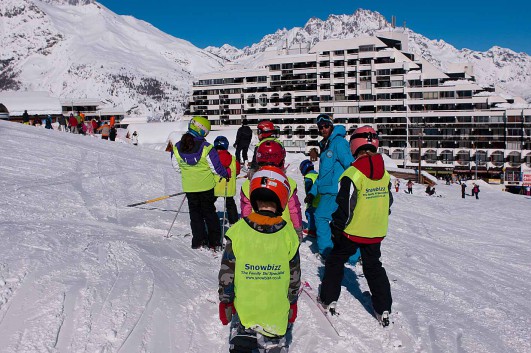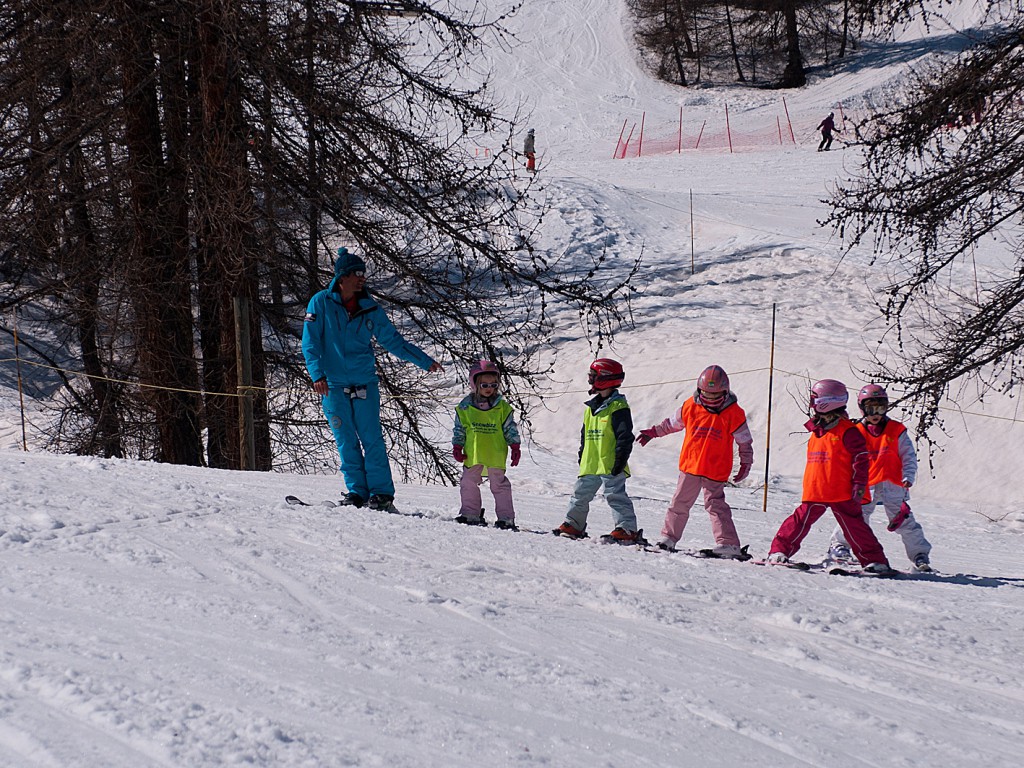Children’s ski school disaster stories are common. Yet with a bit of homework it can be a great success.
All of you, without exception, will have done lots of research before selecting your child’s nursery or primary school. If you want a really successful family ski holiday exactly the same amount of effort has to go into looking at ski schools.
Do your homework!
Phone! And ask lots of questions to determine exactly who will be teaching your child. If you’re holidaying with a big company in a larger resort you will probably be dropping your child off, or they will be being collected from your accommodation, and you might never actually get to meet the instructor. If you just leave it to chance and don’t ask the necessary questions beforehand, you could not only be making an extremely expensive mistake but worse, your child might end up hating the sport which you love.
Is your child going to be in an exclusive lesson with hand-picked instructors or are they just being plonked in a large hit and miss group?
Thankfully there are lots of really good ski instructors who are passionate about teaching and able to communicate this to children in a really fun way. But equally there are many disaster stories. Excellent skiers don’t necessarily make excellent instructors, and as everywhere there will always be teachers who chose their career for the wrong reasons. As a British parent, how can you be sure you’re getting the best tuition possible? On websites and brochures they can look and sound the same. The choice can look confusing but there are really 2 basic options: Local Ski Schools or Tour Operator Ski Classes.
Private Lessons with Local Ski Schools
This can work really well with children as young as three and can even be cost effective in smaller resorts. In the French Alps, expect to pay between 40 -80 euros per hour for one or two children. We would recommend 2 hours every morning for ages 5 plus. 1 hour is plenty for 3 or 4 year olds as they can get tired. Don’t be afraid to ask for the instructor who is best with kids. This might seem obvious, but in every ski school there will be the real natural kids teacher, but he or she might not always be allocated all the kids classes.
Pros – Low season you can request a recommended instructor and are likely to get them.
Cons – High season the most popular/best instructors get booked out a year in advance. If children are very different levels you will need to book two instructors.
Group Lessons with Large Local Ski Schools
These can be very large schools and the most hit and miss option. The class sizes can be anything from 5 up to 14 or more, with the lesson in two languages and the range/standard of teaching (and love of children!) really varying from school to school. Although the grading system is done on the first day, if the children haven’t quite got their ski legs back, and the school doesn’t have the necessary flexibility, they can be stuck in an unsuitable class and under-achieve. In Europe prices vary from 100-300 euros per child per week for morning lessons.
Pros – None we can think of. There are some great instructors in these schools, but until the good ones sort out the bad ones it’s a lottery! The only way it will be a success is, if you are sure you will have one of the better instructors, and for that you will need some insider knowledge.
Cons – Judging from all the stories we hear there are too many cons to list. Overall the Americans have the best reputation. In Europe the odds are high that with the wrong instructor your child will end up hating skiing. The size of class, mixed language and possibly having no siblings or friends in the class can be totally intimidating even for the most extrovert child.
Group Lessons with British/English speaking Ski Schools
Fortunately there are now a number of smaller English-speaking ski schools who do everything possible to make lessons as much fun as possible. The English spoken is either native or fluent, class sizes are guaranteed smaller and children will be properly taught. There is still the chance that a rogue instructor has managed to exist in one of these schools, but less likely, as with smaller marketing budgets, their reputation is everything. The majority vote counts and any instructor not coming up to standard will normally be invited to leave.
Pros – Small, well-taught classes, excellent English and the chance you’ll find a real hero.
Cons – If they are good they will book up really quickly. You will need to book super-early.
Operators with their own in-house Ski School
There are just three British tour operators with their own in-house ski schools: us, Interski and Ski2 in Italy. This has to be the icing on the cake – you have the benefit of knowing that all their instructors are hand-picked and, as the tour operator directly controls every aspect, the chances of success are far greater than anywhere else.
Pros – As above, small, friendly classes, greater flexibility. Tour operator staff and instructors both working together with a common aim. You will get direct feedback from the instructors themselves.
Cons – Honestly none: the whole idea of having your own ski school is to set standards.
Ski operators employing private instructors from local Ski Schools
Most British tour operators, even the house-hold names, do not have the resources to offer a full in-house ski school, so they do the next best thing: employ a few local instructors in each resort, on a private, hourly basis and package it up with a catchy name. From the outside it looks like their own bone fide ski school, but is in fact groups of private lessons. It works well when they are using one of the smaller English-speaking ski schools, but the flexibility/standards will vary from resort to resort, depending on numbers and whether the operator is actually able to hand-pick who they are working with.
Pros– Great if really good instructors are employed and classes kept small.
Cons– Although it’s still exclusive to their guests, they can’t always offer a full range of classes and progression can be hindered. Siblings can end up with one having lessons in the morning, and the other in the afternoon.
Tour operators with no influence over ski classes!
A handful of companies are a bit naughty and package their brochures/websites to make you believe you have all of the above. But whilst you go off thinking your children are being looked after in small, friendly groups they might actually be in one of the larger ski schools with several nationalities. This is often softened with “a ski school helper”, usually really sweet gap year students, who are great with the kids, but have no control over the actual lesson. If it’s a great instructor and a small class it will work. But it’s back to playing the lottery again. In skiing, big isn’t always beautiful. Bad instructors can always slip through!
The two most important questions to ask before investing in/choosing your child’s ski school:
- Is this a class exclusive to my tour operator or are you taking my child and putting him/her into a non-exclusive local ski school group?
- If it’s going to be a non-exclusive group then you need assurances/testimonials about their instructors. Don’t do the very British thing of labelling yourself ‘difficult’ and worrying about pushing the point. Any tour operator worth their salt as a real family specialist will LOVE to talk all the finer points of children’s skiing, and definitely won’t think you’re being difficult.
Then:
- What’s the average and maximum number for the group?
- What flexibility exists for high fliers or nervous skiers?
- How will your child be allocated the right class on the first morning?
- If on the first morning they end up in the wrong class (1st morning wobbles they often do!) then are instructors in radio contact to make swaps or will it have to wait until next day.
- How far is the ski school meeting place from our accommodation and how will they get there.
- What’s your policy on siblings of differing standards wanting to be in the same class.
- How will daily feed-back be given on my child’s progress?
- Remember before you book, do ask every single question and be satisfied with the answer.



